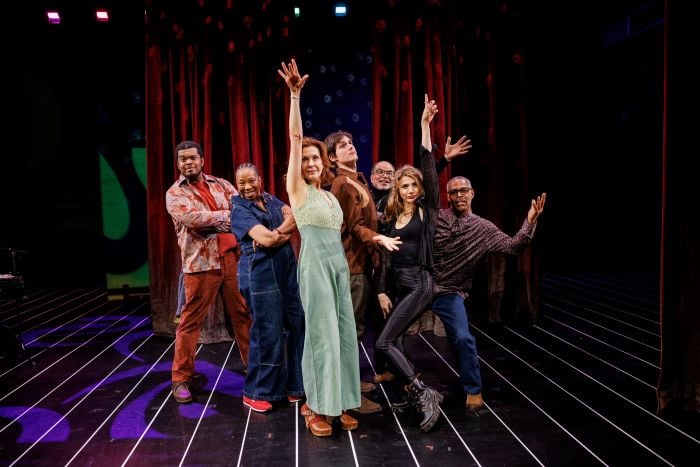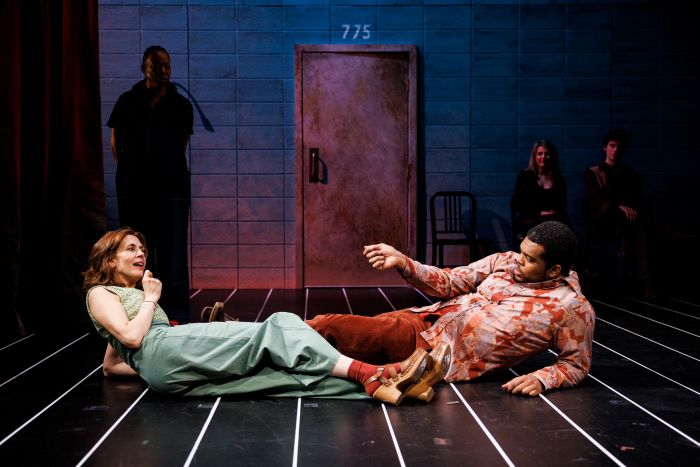Founded in 2005 by Artistic Director Mikhail Baryshnikov, Baryshnikov Arts has launched its 20th anniversary season with the world premiere of A Mother, a loose time-traveling metatheatrical autobiographical adaptation with music of Bertolt Brecht’s 1932 banned play The Mother (itself based on the 1906 novel of the same name by Maxim Gorky), written by Neena Beber, and co-conceived by Beber and Jessica Hecht, who stars in the titular role and serves as narrator for her story.

Reset in the present and told by her adult self, the updated version combines the format of a memory play, in which the recollections of Jess as a teenager, visiting her grandparents in Miami Beach in the pivotal year of 1979-80, when she met her first love Daryl at a disco and a white male jury acquitted police of the brutal murder of Arthur McDuffie, triggering three days of race riots in Miami, are interwoven with that of a play-within-a-play, when, after the death of her grandmother, she was sent to summer theater camp in her home state of Connecticut and was first introduced to Brecht’s play, its socio-political theme of a mother’s activism inspired by her son’s revolutionary pursuits, the Brechtian technique, and the playwright’s anti-fascist stance by her adamant camp counselor Michelle (though the kids were supposed to be rehearsing Lerner and Loewe’s 1951 Gold Rush musical comedy Paint Your Wagon). And it’s all done in the context of developing the present production, set in 1980 Miami, with Hecht in the lead role of Pearl – her family-based re-envisioning of Pelagea, the impoverished illiterate Russian mother-turned-Marxist in Brecht’s original.

Under the direction of Maria Mileaf, a cast of five players (Fergie Philippe, Delilah Napier, Zane Pais, and Portia, along with Hecht) assumes multiple roles as the storylines and times shift, with split-second transitions and humorous touches (like scenes of the young Jess’s giddy romance with Daryl and of her synchronized swim team the Aquabelles) that lighten the serious themes of cycles and parallels in history (“By looking through the lens of the past, we can see the present better”), the call to action in the face of bigotry and violations of human rights, and the belief that “theater can change the world.” And as in The Mother, songs have been inserted into the play (including such standards as “Wade in the Water,” snippets from “I’m On My Way” from Paint Your Wagon and disco hits like “Funky Town,” and original music by composers Mustapha Khan, Willilam Kenneth Vaughan, and Norman “Skip” Burns, with music direction by Khan, Vaughan on keyboards and vocals, and Burns on percussion and vocals), to reinforce the moods and story lines, underscoring Brecht’s comment: “Will there be singing in dark times? Yes, there will be singing, about the dark times.”
Hecht brings her signature haltingly observant delivery, with spot-on comic timing and sincere underlying commitment, to the personal narrative, directly addressing the audience to set the stage, locale, and year, making funny asides, saying Kaddish, relating to Brecht’s story as a mother herself, and impeccably switching from one character to another as she changes her speech pattern, demeanor, and accessories (costumes by Katherine Roth; props by Thomas Jenkeleit) without missing a beat (her embodiment of the fifteen-year-old lovestruck Jess is especially amusing and endearing). Philippe, portraying Daryl, Pelagea’s son Pavel, and Pearl’s son Pablo, is the perfect match for Hecht, and, like her, also provides mindful breaks through the fourth wall with his razor-sharp perspective on the plays, the characters, and the times (especially powerful is his assertion that he’s “not gonna play two Black men both shot by an officer’s gun forty years apart).

Rounding out the chameleonic company are Napier, Portia, and Pais, who sing (Portia’s long note is a blockbuster; Pais’s performance of the didactic “Let’s Make It Strange” as Brecht is a lesson in his thoughts), dance (with lively choreography, from disco to swimming, by Shura Baryshnikov), assume a variety of roles (Napier’s Michelle and Police Officer are loud and aggressive; Portia as McDuffie’s mother Eula Bell is profoundly poignant and adds heart and focus to the show’s title), and contribute to the densely packed play’s laughs and resonance.
Neil Patel’s minimal set, with two rows of stage curtains (that are pulled aside by the cast for the segments in theaters), a mirrored disco ball that drops from above, movable chairs, and a back wall and floor that evoke a swimming pool, changes easily from one location to the next, enhanced with appropriate lighting by Matthew Richards and sound by Nick T. Moore.
With the fast-paced direction and instantaneous switches of characters, there can be moments of confusion on the part of the audience, but Hecht’s running commentary helps to clarify each segment, and the overall message of the recurrent need for action throughout history is brought home by the engaging cast. It’s a production that will make you laugh, while appreciating the role theater and artists can and should have in addressing serious issues and making a change for the better.
Running Time: Approximately one hour and 40 minutes, without intermission.

A Mother plays through Sunday, April 13, 2025, at Baryshnikov Arts, 450 West 37th Street, NYC. For tickets (priced at $55-75, plus fees), go online.



